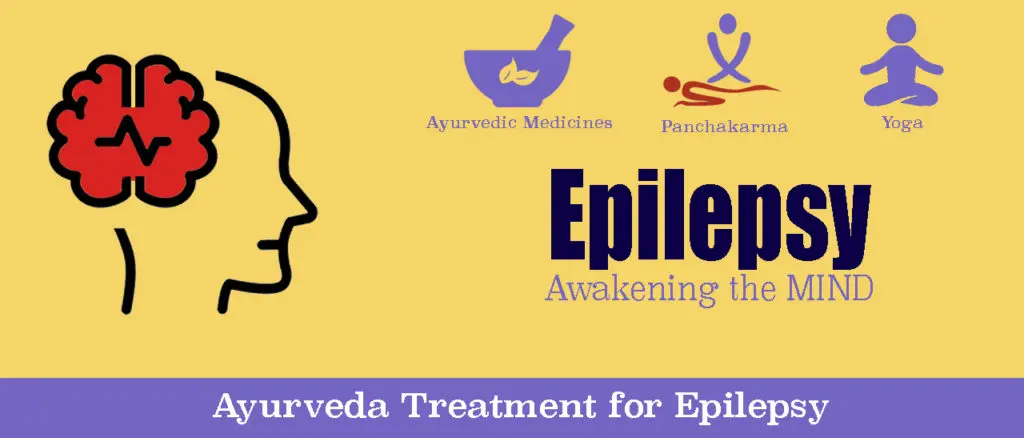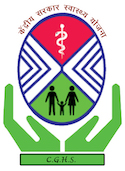Epilepsy is a condition which means “seizures”. Seizures are sudden blackouts due to unprecedented activity in the brain tissues. Brain cells, neurons, work on an electrical impulse and when this current changes, this leads to the sudden onset of seizures.
Seizure is a condition of blackout. At the time of the seizures body starts moving without any control and certain symptoms appear in this duration. And patient cannot remember what exactly happened in the duration of the seizure. Ayurveda treats this condition of epilepsy with great success and you can get rid of the problem of epilepsy through Ayurvedic treatment.
This is noticed that patient keeps on taking the medicines regularly, dosages of these medicines keeps on increasing and similarly the frequency of seizures keeps on increasing. Ayurveda is promising in resolving the issue of the epilepsy. With Ayurveda treatment you can not only get rid of the problem of the epilepsy but also can get back to normal life too. Here are details about the epilepsy and its Ayurveda treatment.

Facts on Epilepsy
- Epilepsy is a common neurological disorder
- It is also termed seizure disorders.
- Epilepsy is characterized by unpredictable seizures or fits that can even cause other health issues
- It is a spectrum condition. The seizure type has a wide range, and the control varies from person to person.
- More than 65 million people around the world suffer from epilepsy
- Epilepsy is more common in children and adults, but anyone can develop it.
- The prevalence of epilepsy is slightly more in male than in female.
- Western medicine has no cure for epilepsy, but medications and other strategies can manage this condition.
- Epilepsy is not caused due to any mental illness.
- Severe seizures may cause brain damage, but most seizures do not cause any harm to the brain.
- Most of the people who have epilepsy live an active and full life. However, they are at risk of abnormally prolonged seizures, inability to regain consciousness between the seizures, accidents or unexplained death.
- Ayurveda has complete cure of the epilepsy.
Symptoms of Epilepsy
The main symptom of epilepsy is seizures.
The symptoms depend upon the type of seizures and from person to person.
Partial seizures
Simple partial seizures – A partial seizure does not involve the loss of consciousness.
Other symptoms include:
- Tingling and twitching of limbs
- Dizziness
- Alteration to the sense of smell, sight, touch, hearing or taste.
Complex partial seizures – It involves following symptoms:
- Loss of consciousness
- Staring blankly
- Repetitive movements
- unresponsiveness
Generalized seizures
Generalized seizure affects to the whole brain. It of 6 types:
- Absence seizures – Absence seizures cause a blank stare. It also causes repeated movement such as lip-smacking or blinking. There may be loss of awareness for a short period.
- Atonic seizures – Atonic seizures lead to loss of personal control and the patient fall suddenly.
- Tonic seizures – Tonic seizures lead to muscle stiffness.
- Clonic seizures – Clonic seizures are characterized by jerking and repeated muscle movements of neck, face and arms.
- Myoclonic seizures – Myoclonic seizures lead to spontaneous twitching of legs and arms.
- Tonic-clonic seizures – The symptoms of tonic-clonic seizures include shaking of the body, biting of the tongue, and loss of consciousness and loss of bladder or bowel control.
Some patients suffer from asymptomatic phase before the onset of epileptic fits. The signs of asymptomatic phase include:
- Rigidity of muscles
- Fatigue
- Involuntary twitching of eyebrows
- Rapid debating movement of Eyes
- Drooling
- Congestion in heart
- Disinterested in food
- Body ache
- Hearing sounds of voices for Hallucinations
- Feeling of spasms
Causes of Epilepsy
In about 6 out of 10 people who have epilepsy, the cause remains unknown.
Possible causes include:
- A very high fever or illness
- Lack of oxygen to the brain
- Traumatic Brain injury
- Stroke
- Scaring on the brain after the injury to the brain
- Brain cyst or tumour
- Prenatal injury, lack of oxygen at birth or brain malformation
- Maternal drug use
- Dementia for Alzheimer’s
- Developmental disorders on neurological diseases
- Infectious diseases such as meningitis or AIDS
- Genetic – In some epilepsy, hereditary plays a role. If one parent has epilepsy linked to genetics, it increases the risk of child 2 to 5 per cent.
Triggers for Epileptic Seizure
Identify the situation and things that can trigger epileptic seizures are:
- Illness or fever
- Stress
- Lack of sleep
- Caffeine
- Alcohol
- Certain medicines or drugs
- Bright light or flashing lights
- Overeating or skipping meals
- Specific food ingredients
Identification of triggers is not easy. Any single incidence that follows a fit is not a trigger. Combination of several factors trigger seizures.
It is advised to maintain a diary or journal and note the points discussed below after each seizure:
- Date and time
- The activity you were involved in
- Unusual stressors
- Usual found or sites
- Level of fatigue
- How well you slept at night before
- If you have eaten anything after a long time
Also, note down what you felt just before and after the epileptic fits and it any side effects. It is advised to bring the journal with you whenever you visit your doctor to explore treatment.
How Epileptic Sezuires Occur
Epileptic seizures occur due to changes in the brain that cause it to get too excited or irritated. As a result, the brain cells or neurones in the brain starts sending abnormal signals.
Neurones send electrochemical impulses that act on other neurones, muscles and glands to produce human actions, feelings and thoughts. In epilepsy, the regular neuro activity gets disturbed that lead to unpredictable and repeated seizures. It causes changes in attention such as muscles twitching, lack of concentration or loss of consciousness.
During an epileptic seizure, a neurone may fire as many as five hundred times a second faster than in normal.
Apasmara: Ayurveda About Epilepsy
Ayurveda describes the condition of epilepsy in great detail. There is a condition described as Apsmar, which we are talking as Epilepsy here. While discussing the basic nature of the disease, Charaka Samhita quotes-
अपस्मारं पुनः स्मृतिबुद्धिसत्त्वसम्प्लवाद्बीभत्सचेष्टमावस्थिकं तमः प्रवेशमाचक्षते ||
The verse means- There are disturbances of the three aspects of the body- Smriti (memory), Budhi (intellect) and Sattva (psychic). Because of loss of these three patient’s body starts behaving weirdly and he loses all his memory associated with the whole event.
The second definition is a also complete for this condition-
स्मृतेरपगमं प्राहुरपस्मारं भिषग्विदः| तमःप्रवेशं बीभत्सचेष्टं धीसत्त्वसम्प्लवात्||
Here Punarvasu Atreya talks about different things-
- Loss of memory
- Complete blackout
- Different movements in body parts
These all things happens because intellect and psychic are not working in coordination.
Types of Apasmara (Epilepsy) as per Ayurveda
As per Ayurveda there are different types of the Apasmara. This classification of the Apasmara is according to the involvement of the different doshas. Therefore this condition is of four types- three directly according to doshas and fourth one is where all the doshas are involved. Here are these-
Vataja Apasmara
The symptoms of Vataja Apasmara are-
- अभीक्ष्णमपस्मरन्तं – Very frequent attacks and seizures of the epilepsy
- क्षणेन सञ्ज्ञां प्रतिलभमानम्– The short duration of the seizure, very small attacks.
- उत्पिण्डिताक्षम् – Eyeballs seems enlarged during the seizures.
- असाम्नाविलपन्तम्– Meaningless sounds/ uttering of the words.
- उद्वमन्तं फेनम्– Froth from mouth.
- अतीवाध्मातग्रीवम्– Stiffness of the neck.
- आविद्धशिरस्कं– Head rolls on a side.
- विषमविनताङ्गुलिम् – Stiffness and deformed shape of fingers.
- अनवस्थितपाणिपादम् – Instability in arms and legs.
- अरुणपरुषश्यावनखनयनवदनत्वचम् – Dryness increases in nails, eyes, skin.
- अनवस्थितचपलपरुषरूक्षरूपदर्शिनं – After the attack patient tells about hallucinations like looking some unstable, moving and blackish objects.
- वातलानुपशयं विपरीतोपशयं च वातेनापस्मरन्तं विद्यात् – Food and medicines which causes imbalance of the Vata increases the complexity of the disease.
This is the most detailed and comprehensive description of the epilepsy. Modern medicine doesn’t have this much of clarity about the different signs and symptoms of the Epilepsy.
Pittaja Apasmara
- अभीक्ष्णमपस्मरन्तं – Frequent seizures
- क्षणेन सञ्ज्ञां प्रतिलभमानम् – Quick recovery time
- अवकूजन्तम् – Problem in breathing when attack comes.
- आस्फालयन्तं भूमिं – Patient falls on the ground suddenly.
- हरितहारिद्रताम्रनखनयनवदनत्वचं – Yellow coloration of skin, eyes and nails.
- रुधिरोक्षितोग्रभैरवादीप्तरुषितरूपदर्शिनं – Hallucinations of red, bright and terrifying objects.
- पित्तलानुपशयं– Food and medicines which aggravates the pitta, complicates the condition of the patient.
Kaphaja Apasmara
- चिरादपस्मरन्तं – Seizures doesn’t appear very frequently.
- चिराच्च सञ्ज्ञां प्रतिलभमानं – Patient regains the normalcy after a long period.
- पतन्तम् – Patient falls on the ground.
- अनतिविकृतचेष्टं– While falling down, there are not severe movements or any problems.
- लालामुद्वमन्तं – Excessive saliva secretions.
- शुक्लनखनयनवदनत्वचं – Whiteness in the skin, nails and eyes is predominant.
- शुक्लगुरुस्निग्धरूपदर्शिनं– Patient has hallucinations of whitish, soft things.
- श्लेष्मलानुपशयं – foods and medicines which aggravates kapha increase the problem of the patient.
With all these details, it is easy to diagnose the condition properly. Right diagnosis is the key for the right treatment.
Ayurveda Treatment for Epilepsy
तैरावृतानां हृत्स्रोतोमनसां सम्प्रबोधनम्| तीक्ष्णैरादौ भिषक् कुर्यात् कर्मभिर्वमनादिभिः||
Because the Doshas occlude the heart-mind and brain triad. Therefore to remove this covering (aavaran) from these, quick acting and strong activities of Panchakarma are important. And as per the Doshas these are done differently.
Here are the details about the different panchakarma procedures according to involvement of the doshas.
- For Vata Aggravation – Basti Treatment
- Pitta Aggravation – Virechana therapy.
- In case of Kapha Aggravation – Vamana procedure.
These procedures are mentioned and indicated in case of the treatment of epilepsy.
In case of the seizures Nasya is advised as the treatment. Because Nasya ensures the quick disposal of medicines to the nervous system. And brings back the senses immediately. So you need to discuss with your Ayurveda physician about the right medicine for Nasya.
If all the guideline of the treatment are obeyed properly, Ayurveda treatment can help you to bring off the medicines.
The main problem with conventional medicines is they leave a lot of marks on the body and mind. These medicines cause dullness and clumsiness of the body and mind, therefore complicates the things. But Ayurvedic medicines doesn’t bring any such changes in the body. Patient feels more energetic and more oriented. Therefore this is always a better option to go for Ayurvedic medicines for epilepsy.
Queries about Epilepsy Treatment
Here are few commonly asked questions regarding the Ayurveda treatment of epilepsy at Sukhayu Ayurved. We are summarising all known questions. But you can drop an email for any further query.
No. In case of epilepsy, you need to come to Jaipur for a proper Ayurvedic consultation with Vaidya Pardeep and Vaidya Neetu. In more than 90% cases of epilepsy we only give medicines to patients. So you need to continue the medicines back at home.
Medicines remain continue for 18 to 24 months.
Patient need to travel to Jaipur only once in 6 months. But in severe cases our Vaidyas may ask you to come in short spans too. This is decided after the first consultation only. Therefore, we don’t have any generalised rules for this.
We only prescribe the Ayurvedic medicines to our patients. Most of these medicines are – herbal and are prepared at Sukhayu only, under guidance of Vaidya Pardeep Sharma.













